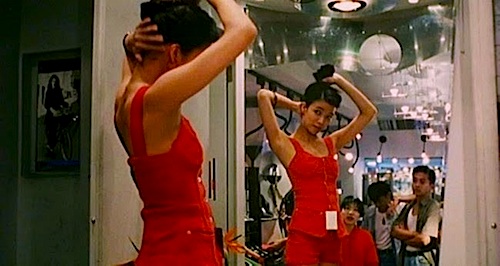By Joe Bendel. If Hsiao-kang is like Tsai Ming’s Antoine Doinel, than this would be his 400 Blows. However, unlike Truffaut’s pseudo-alter-ego, Hsiao-kang is already a completely disillusioned young man before we ever meet him Tsai’s feature debut. He is not alone. Just about everyone is disenchanted and dissatisfied with their lives, yet they continue in a hazy state of languor throughout Tsai’s breakout contemporary classic Rebels of the Neon God, which finally gets a legit theatrical release this Friday in New York.
It is 1992. You can still find phone booths and coin operated video game arcades in Taipei. In fact, boosting change from pay phones is a specialty of low life thieves Ah-tze and Ah-ping. They will unknowingly cross paths with cram school drop-out Hsiao-kang, who starts shadowing the former, after the surly punk intentionally bashes the side mirror of the cab driven by Hsiao-kang’s father.
Frankly, it is not as if the father and son are particularly close. In all honesty, their relationship is so strained, Hsiao-kang’s more indulgent mother becomes convinced her son is the reincarnation of Nezha, the Neon God, who tried to kill his adoptive human father. Needless to say, Hsiao-kang and his father do not see it that way. Nevertheless, when Hsiao-kang recognizes Ah-tze, he obsessively follows the sociopathic youth. Already living a marginalized existence, the petty thief crashes in a dingy flat that constantly floods and seems determined to sabotage his ambiguous romantic relationship with Ah-kuei, a pretty bowling alley attendant. Unfortunately, Hsiao-kang will bring a fresh serving of trouble at an especially inopportune moment for Ah-tze.
Appropriately filled with neon lights and rain-glistening streets, Rebels has a deeply urban sensibility. Ironically, Ah-tze never recognizes the nebbish Hsiao-kang, despite their frequently close proximity. Instead, it is Ah-tze who recognizes oblivious Hsiao-kang’s father when he forced to hail his cab under hectic circumstances, late in the third act.
Throughout Rebels, one can see Tsai’s kinship to fellow countryman filmmaker, Hou Hsiao-hsien. While Tsai’s cinema would get slower, certain hallmarks remain, including his touchstone character. As much an anti-hero as an everyman, Hsiao-kang would resurface in many subsequent Tsai films, including Vive L’Amour and What Time is it There?, which invites open comparison to the Doinel films with its frequent 400 Blows references and a genuinely touching rather than gimmicky cameo appearance from the distinguished Jean-Pierre Léaud, himself.
Rebels also represents the continuation of a beautiful working relationship between Tsai and actor Lee Kang-sheng, following his work in a short film the director made for Taiwanese television. In addition to his numerous turns as Hsiao-kang, he also appears as the monk in Tsai’s Walker experimental films, and directed his director in the best segment of the anthology film Taipei 24H. As Hsiao-kang, his signature role, Lee is weirdly disconcerting. He is shy in a passive aggressive manner. He is a put-upon sad sack, yet Lee always hints at something dark and dangerous buried deep within his psyche.

Despite her impossibly short Daisy Dukes, the emotional nuance and vulnerability of Wang Yu-wen’s performance as Ah-kuei is quite remarkable. While Tsai uses her as a symbol of neediness (decked out in striking red), Wang gives her soul and substance. Likewise, veteran martial arts character actor Tien Miao elevates Hsiao-kang’s father well above and beyond mere Freudian caricature, which also helps set up What Time is it There?, in which Hsiao-kang struggles to come to terms with his recent death.
Someone like Criterion really ought to collect all the Hsiao-kang films into a boxed set, as a means of calling them out. They represent some of Tsai and Lee’s most accessible and resonant work. Obviously, Rebels is a perfect film to start on. Combining street level grit with a dreamy nocturnal vibe, it is fully formed cinematic statement on youth angst and alienation. Highly recommended, Rebels of the Neon God opens this Friday (4/10) at the Quad Cinema downtown and the Elinor Bunin Munroe Film Center uptown, and also screens during the upcoming Tsai Ming-liang retrospective at the Museum of the Moving Image.
LFM GRADE: B+
Posted on April 8th, 2015 at 10:12pm.